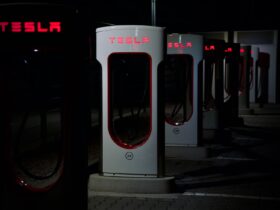The development of electric vehicles (EVs) has been rapidly increasing in recent years. With this growth, the need to install and maintain charging stations has never been higher. To meet the growing demand, becoming an EV charging station contractor is a great career opportunity for those interested in the green energy industry. Becoming an EV charging station contractor requires knowledge and skill, but with some guidance and dedication it can be achieved.
What is an EV Charging Station Contractor?
An EV charging station contractor is a professional who specializes in the design, installation, and maintenance of electric vehicle (EV) charging stations. They are responsible for overseeing all aspects of the process from start to finish, ensuring that each station meets local codes and regulations for safety and efficiency. In addition to installing individual charging stations, contractors may be called upon to design entire networks of them for commercial or residential properties.
Becoming an EV charging station contractor requires knowledge of electrical systems, building codes, safety protocols, and customer service skills. Prospective contractors should also have a working knowledge of local zoning laws as they relate to EV infrastructure development. With the right qualifications and experience, contractors can make a great living helping customers get their electric vehicles on the road with reliable access to recharging locations.
Qualifications of EV Charging Station Contractor
Electric vehicles are becoming increasingly popular due to their low emissions and cost savings. If you’re interested in joining the growing field of electric vehicle charging station contractors, there are a few basic qualifications you’ll need to meet. Becoming an electric vehicle charging station contractor requires a comprehensive understanding of electrical systems, renewable energy sources, and the ability to think critically to spot potential problems or safety hazards.
Electric vehicle charging station contractors must also have relevant certifications that demonstrate they understand the fundamentals of electricity, such as wiring and installation. In addition, contractors should have experience with equipment maintenance and troubleshooting. It is also beneficial if they can show proof of previous work in similar projects involving renewable energy sources or electrical components. A valid driver’s license may be necessary for some positions as well as possession of certain tools to complete jobs quickly and safely.
Training: How to Acquire Necessary Knowledge?
If you’re interested in becoming an electric vehicle charging station contractor, it’s important to know what kind of training is necessary. Becoming an electric vehicle (EV) charging station contractor requires a combination of education and hands-on experience. One option is to attend technical schools or trade schools that offer courses in electrical work and installation.
Industry organizations, such as the National Electric Contractors Association (NECA) and the National Renewable Energy Laboratory (NREL), also offer training and certification programs specifically for EV charging station contractors. Some manufacturers of EV charging equipment also provide training programs, giving contractors hands-on experience with specific systems and equipment.
Online courses and resources are also available for those who want to learn more about the installation and maintenance of EV charging stations. Apprenticeships provide a chance to work with experienced contractors and gain practical experience in the field. On-the-job training, starting a business and learning as you go, is another option. Certification programs through organizations like the NECA and NREL provide recognition and credibility to contractors who have completed the required training and passed an exam. Attending industry events and networking with other contractors can also help contractors stay up-to-date with industry trends and best practices.


Licensing: What Certifications are Required for EV Charging Station Contractor
If you are interested in becoming an electric vehicle charging station contractor, then the first step is obtaining the necessary certifications and licenses. Depending on your state or local jurisdiction, this process may vary slightly.
For example, some states may require contractors to have a general contractor’s license, as well as additional specialties like electrical contracting or air conditioning/refrigeration contracting. Additionally, most states will also require contractors to obtain liability insurance in order to protect their customers from any issues that arise due to negligence.
Finally, many jurisdictions have specific regulations related to the installation of electric vehicle charging stations; these should be researched and understood prior to beginning a project. It is important for potential contractors to be aware of all relevant licensing requirements before attempting any installation work so that they are able to fulfill their commitments without any legal repercussions.
Equipment: What Products are Used?
Electric vehicle (EV) charging station contractors typically use a variety of products to install and maintain EV charging stations. Some of the most common products include:
- Charging equipment: This includes the charging stations themselves, as well as all the components that make up the station, such as the charger, the power management system, and the cables and connectors.
- Electrical components: Contractors need various electrical components to install and maintain the charging stations, such as circuit breakers, conduit, wire, and cable.
- Tools: Contractors use a range of tools, such as drill bits, saws, and wire strippers, to install and maintain the charging stations.
- Safety equipment: To ensure the safety of themselves and others, contractors use safety equipment, such as gloves, safety glasses, and hard hats.
- Testing equipment: Contractors use testing equipment, such as multimeters and voltage testers, to ensure the charging stations are functioning properly.
- Software and management systems: Many charging stations come equipped with software and management systems that allow operators to monitor usage, track energy consumption, and manage the charging process.
- Marketing and advertising materials: To attract customers and promote their services, contractors may use marketing and advertising materials, such as brochures, business cards, and signs.
The specific products used by EV charging station contractors will depend on the type of charging station being installed and the specific requirements of the project.
Opportunities: Where Can You Work?
As electric vehicles become more popular, so does the need for more charging stations. This means there are opportunities for people to become an electric vehicle charging station contractor. Contractors provide the infrastructure needed to keep these vehicles powered, allowing drivers to easily find places to charge their cars and avoid running out of battery while on the go.
If you’re interested in becoming an electric vehicle charging station contractor, there is a variety of places you can work. Contractors can work with local municipalities who may be looking for chargers in public spaces like parking lots or garages. Additionally, businesses like hotels and restaurants could also hire contractors to install chargers at their properties in order to attract customers who drive electric vehicles. Finally, private individuals may contact contractors directly if they want a charger installed at home or office buildings which may have multiple tenants with EVs.
Conclusion
Electric vehicle charging station contractors play an important role in helping to ensure that EV owners have access to the necessary infrastructure for their vehicles. In this article, we looked at how to become an EV charging station contractor by understanding the qualifications, benefits and responsibilities associated with the job.
Overall, there is no doubt that electric vehicles are charging ahead! As EVs become even more popular and accessible, so too will be the need for qualified EV charging station contractors – allowing them to play a key role in keeping up with demand while helping advance a more sustainable future. With the right qualifications and mindset, anyone can join this fast-growing industry and make a difference.




